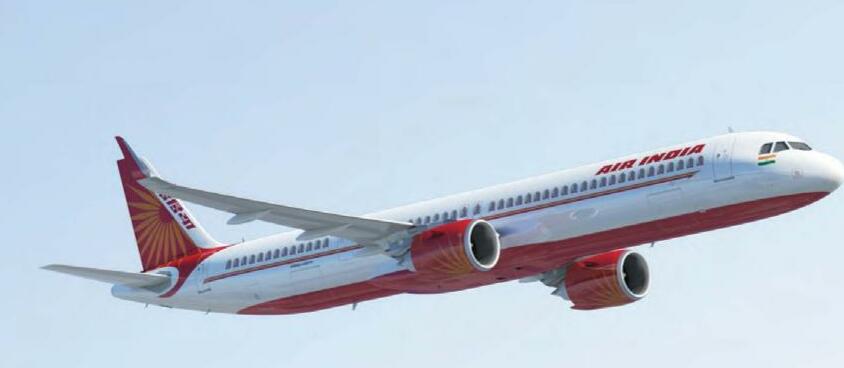
It may be mentioned that although the airline's single-aisle fleet is made up entirely of the A320 family aircraft, including A321s, this is the first latest-generation A321neo to join its fleet. This is for the first time that Air India has received delivery of a single-aisle airliner after its acquisition by Tata Group. Air India has said that it will be ordering 250 Airbus aircraft to boost its domestic and international operations. The commitment includes 140 A320neo and 70 A321neo single-aisle aircraft as well as 34 A350-1000 and six A350900 wide-body jets.
"Airbus has been a longstanding partner of Air India, and these new aircraft will play an important part in delivering Vihaan.AI, Air India's comprehensive transformation and growth strategy," said Campbell Wilson, CEO and MD, of Air India.
"This is a historic moment for Airbus and for Air India. India is on the verge of an international air travel revolution and we are honoured that our partnership with the Tatas and our aircraft solutions will write that new chapter for the country's air connectivity," Christian Scherer, Airbus Chief Commercial Officer and Head of International, had said.
The A321neo is the longest-fuselage member of Airbus' best-selling, single-aisle A320 Family, comfortably seating 180 to 220 passengers in a typical two-class layout, and as many as 244 in a higher-density arrangement.
The A320neo typically accommodates from 140 to 170 passengers, with a maximum capacity of up to 180 travellers.
Culinary delight onboard Al!
This story is from the April 2023 edition of Cruising Heights.
Start your 7-day Magzter GOLD free trial to access thousands of curated premium stories, and 9,000+ magazines and newspapers.
Already a subscriber ? Sign In
This story is from the April 2023 edition of Cruising Heights.
Start your 7-day Magzter GOLD free trial to access thousands of curated premium stories, and 9,000+ magazines and newspapers.
Already a subscriber? Sign In

Adani Airport Thales Forge Strategic Partnership to Improve Airport Operations and Passenger Experience in India
Adani Airport Holdings Limited (AAHL), the largest private airport operator in India, and Thales, a global leader in advanced technologies, today announced a strategic partnership to revolutionise AAHL’s international airport operations and passenger experience across the country.

ADVANCING AIR MOBILITY OVERCOMING CHALLENGES, SEIZING OPPORTUNITIES
Advanced Air Mobility (AAM), as analysed by M P RAJASEKHARAN, explores solutions for reducing urban congestion and enhancing access to remote locations through sustainable, automated air transport systems, addressing key challenges and future opportunities in this evolving sector.

ON THE CUSP OF GROWTH
The growth of regional airlines in India will increase the market for regional jetliners.

BOEING STRIKE DISRUPTS INDIAN CARRIERS' EXPANSION PLANS
The Boeing machinist strike has stalled aircraft deliveries, directly affecting Akasa Air and Air India Express, both of which are now facing delays in their fleet expansion efforts, highlights

REGIONAL AIRPORTS MUSHROOMING WITH CHALLENGES GALORE
Karnataka's push for regional air connectivity has led to a surge in airport infrastructure, yet many of these airports face challenges like fluctuating demand and limited flight frequencies. While the UDAN scheme has supported growth, the long-term viability of several regional airports remains uncertain, highlights

'PHARMACY OF THE WORLD' SUPPLY CHAIN WOES
India's pharmaceutical sector, has achieved remarkable growth, but faces significant supply chain hurdles, including high logistics costs and limited cold chain facilities. Addressing these challenges is essential to sustain its global impact and future expansion, reports

BUMPER WINTER AHEAD FOR INDIAN CARRIERS
The DGCA's winter 2024 schedule approves 25,007 weekly flights, marking growth for Indian carriers, with Air India Express leading in expansion and Vistara set to merge with Air India, analyses

AIRPORT ADVANCEMENT
Indian airports are placing a greater emphasis on digitalisation and enhancing their eco-friendly credentials, updates

THROTTLING AHEAD
The situation with the grounding of Pratt & Whitney GTF engines is now trending downwards, a report

Connecting cities to airports HELI-TAXIS ARE OUT, AIR TAXIS ARE IN
As heli-taxis falter, electric air taxis promise to transform urban connectivity. Yet, scalability, regulations, and operational challenges must be overcome for them to deliver efficient, affordable city-airport travel, reviews